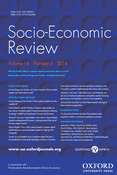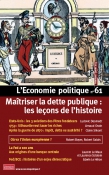In : La dette souveraine: Etat et économie politique, sous la direction de Julia Christ et Gildas Salmon, Collection « Raisons pratiques », Éditions de l’EHESS, Paris, Mars 2018, p. 9-47.
 In En quête d’alternatives. L’état du monde 2018, (sous la direction de Bertrand Badie et Dominique Vidal), La Découverte, Septembre 2017, p.224-230.
In En quête d’alternatives. L’état du monde 2018, (sous la direction de Bertrand Badie et Dominique Vidal), La Découverte, Septembre 2017, p.224-230.
Socio-Economic Review, Discussion Forum: « Brexit: understanding the socio-economic origins and consequences » , 2016, Vol. 14, n° 4, p. 836-845.
Abstract
Jacqueline O’Reilly, Julie Froud, Sukhdev Johal, Karel Williams, Chris Warhurst, Glenn Morgan, Christopher Grey, Geoffrey Wood, Mike Wright, Robert Boyer, Sabine Frerichs, Suvi Sankari, Akos Rona-Tas and Patrick Le Galès
The unprecedented geopolitical shift resulting from Brexit reflects deep socio-economic fault lines within and beyond the UK. In many ways foreshadowing the US presidential election of Donald Trump, Brexit brought to the surface and gave a public voice to socio-economic divisions that were deeply embedded, sometimes illogical, but until now had either been ignored or hushed out of ‘respectable’ public debate. This Discussion Forum emanates from a spontaneous seminar organized 2 days after the Brexit vote on June 25, 2016 as part of the SASE conference held in University of California–Berkeley and followed by an open call for papers by Socio-Economic Review. The papers here draw attention to the origins of the Brexit vote in deep-seated socio-economic divisions (O’Reilly), widening differences in economic performance across sectors and regions of the UK (Froud, Sukhdev and Williams) and the growth of poor quality jobs (Warhurst). Meanwhile, the political dynamics of the Brexit vote were also shaped by the fractured nature of UK business elites (Morgan), divisions between locals and cosmopolitans (Grey) and creative but muddled actions of elites that arguably generated consequences they themselves failed to fully anticipate (Wood and Wright). From the perspective of Europe, Brexit reflects a history of dysfunctional economic policy in Europe that prioritized market competition in ways that neglected and ultimately undermined solidarity (Boyer). Here, Brexit reflects a political strategy to both renationalize and recommodify solidarity in the face of fears over migration, and which are likely to have major consequences for social solidarity in Europe more generally (Frerichs and Sankari). However, Brexit is unlikely to provide a durable social and political solution to the wider tensions between globalization and democracy, which also affect all countries throughout Europe (Rona-Tas). Ultimately, the Brexit vote underlines social divisions that combine class inequalities with regional ones, not just in Britain but throughout Europe (Le Galès).
France Culture Les Carnets de l’économie, émission animée par Dominique Rousset à 17 h 55.
Le 14 décembre 2016 (1/4) – Régimes de croissance et crises périodiques
Le 15 décembre 2016 (2/4) – Ce que n’est pas la Théorie de la Régulation
Le 16 décembre 2016 (3/4) – Diversité des capitalismes
Le 17 décembre 2016 –
Intervention aux journées « Le printemps de l’Economie« , Débat avec Patrick Artus Intervention aux journées de l’Economie, Paris. 27 Avril 2016.
AmiensBoyer3-5dec2014V1Présentation au Colloque « Crise de l’euro, effets discursifs et changements institutionnels : approches transdisciplinaires », CRIISEA, UFREG/Université de Picardie Jules Verne, 3-5 décembre 2014.
Working Paper n° 67, 2014, Working Paper Series, desiguALdades.net, Freie Universität, Ibero-Amerikanisches Institut, Berlin.
in The Euro Crisis and European Political Economy: France, Germany and Central Europe, Ed. by Robert Boyer, Ivan T. Berend, and Kumiko Haba, Aoyama Gakuin University, Tokyo, 2013, p. 25-56.


